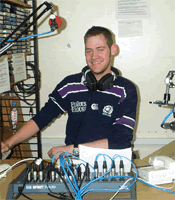





Radio
Radio Profile
Name: Fraser Greig
Occupation: StudentWhat is involved in setting up a radio station?
I am the station manager for the Source, a student radio station at Warrington Collegiate Institute. It has taken myself and a team of radio students 3 years to complete the process. The Source finally got on the airwaves in February 2002. This was due to hard work and teamwork.
The Source began by marketing the station in Warrington town centre, publicising it to our target market by going into the bars and clubs and the students union bar on campus. The station needed funding and so we began various campaigns to raise money. The college provided support for the radio station and got the radio team a studio. The Source spent the three years talking to private businesses, offering sponsorship deals and offering advertising.
We experienced many barriers, especially political barriers internally with regards to the hierarchy in the college. We were asking the right people the wrong questions and so we had to get the support from the top and things began to move.
What made you decide radio was for you?
I did my work placement during school at a local radio station and I loved being on air, answering the phones, making the tea, I loved everything about it and from then on I have wanted to work in radio. I talked to my career advisor at school, who told me about the radio production course at Warrington Collegiate and so I applied direct and got in.
What qualifications do you need to go into radio?
If you are doing a degree in radio then they like you to finish the degree. A lot of people in radio start as receptionists or answering the phone. They don't necessarily want the formal qualification, but experience. If you want to get into radio then go to your local station and be willing to put in a few hours on reception doing the boring work such as filling.
When I started my work placement at Century, I had to cut out adverts from the local papers so that the sales team could follow them up. This was tedious, but only lasted a week.
What skills are required to become a radio presenter?
You need grounding in finance, sales and business. It is important that you are computer literate and knowledgeable in computer editing, such as being able to work on a sound-editing programme.
Radio stations are now using programmes such as RCS, Myriad, dial-it, cool edit pro and Sadie, which are the big editing programmes. People should at least know what they do.
What type of character do you need?
Many people say being able to talk for two minutes on absolutely anything. I do not think you need this quality, you need to be open, know what you are allowed to say and what not to say and be natural, pretend you are talking to friend.
Do you enjoy working in radio?
I love it. I have had quite a few jobs, but I haven't enjoyed any of them as much as radio.
What are the benefits?
Being well known. A lot of people see the hours as a benefit until they actually go and work in a real radio station. You have to be continually looking for material to use on the radio programme as you can get through a lot in three hours. Just reading the paper before you go on air won't help. You have to do a lot of research and this can take four to five hours a day.
Being able to make people laugh and entertaining people.
What advice would you give?
A lot of people who work in radio start in the student radio station. Find out what area of radio you want to do and are good at and stick to it, for example I wasn't sure, but now I know presenting is where my talent is.
If you want to get into radio get a demo tape sorted out. If you want to be a producer put things you have produced together on tape. Make sure it is no longer than about 5 minutes because people are busy.
If you want to be a presenter get a 3 minute demo tape of your best material, a variety of things for example a tease (what the next programme is about), a link between two songs, a time and date check to show you can do everything.
If you have all these qualities and more as well as a burning desire to grab a microphone and disrupt the air waves then radio could be the career for you.







